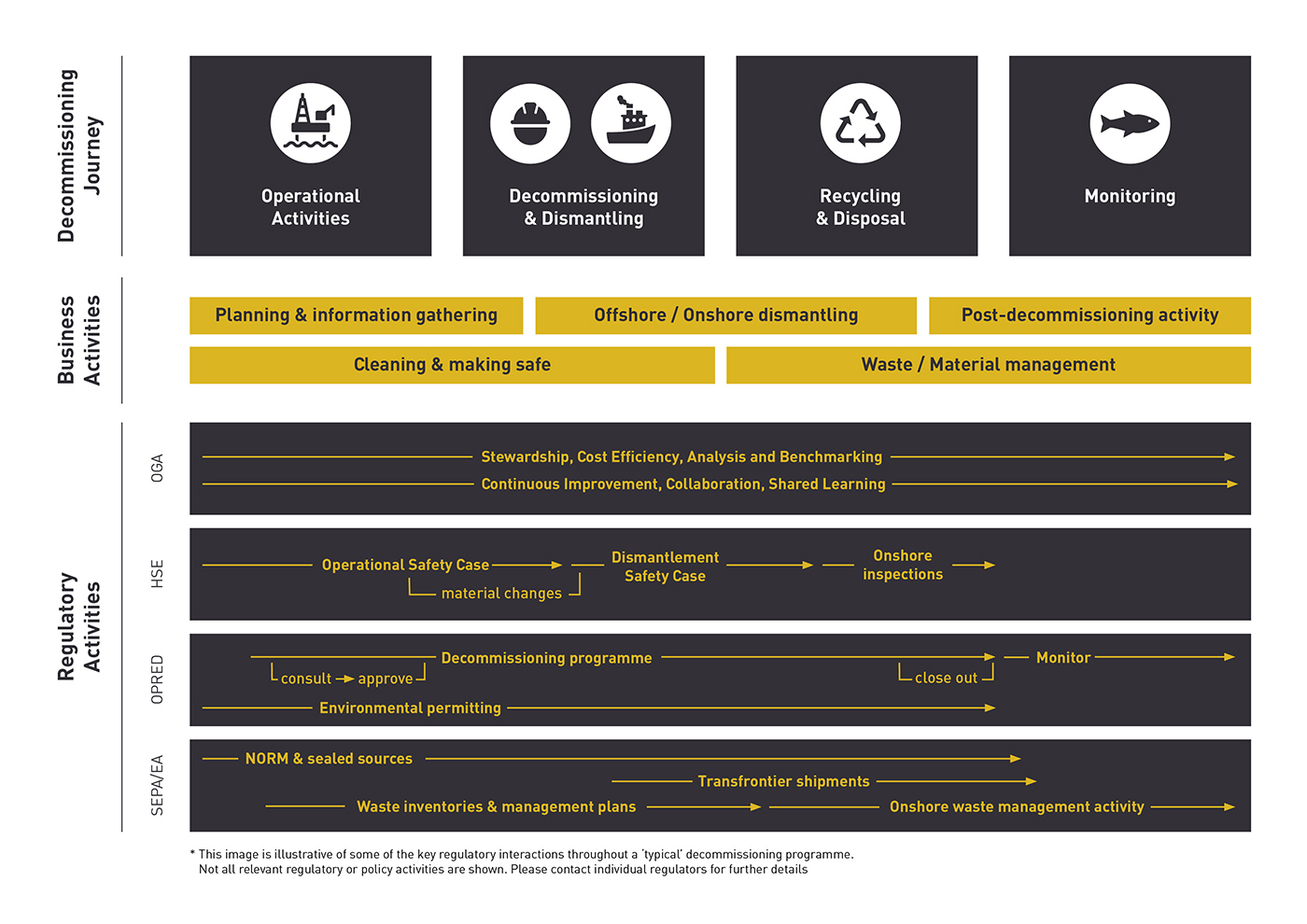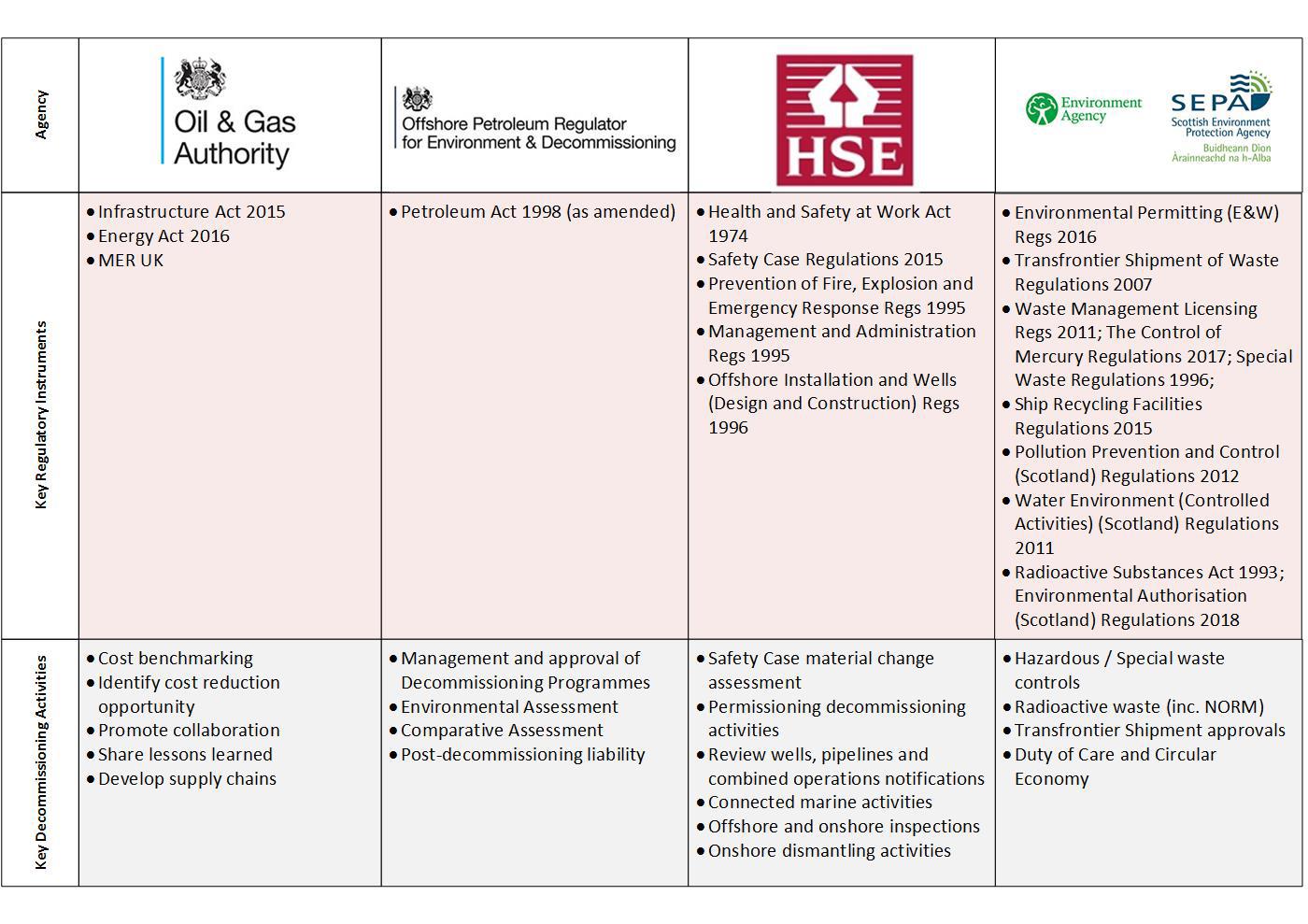Decom Regulation, Policy and Guidance
How is decommissioning regulated in the UKCS?
Decommissioning of offshore oil and gas is impacted by different regulation, policy and guidance. As every decommissioning project is unique, the regulatory journey will reflect the specific needs of every project and activities may be not always be undertaken in the same order every time. We always recommend early engagement with the individual regulators at the start of any decommissioning project to ensure you are aware of the key regulations and any changes which may have occurred.
A high level overview of the regulatory requirements of each of the regulators participating in the DecomRegHub is illustrated below. A higher resolution version of this image can be accessed here
More information can be found below or in our Frequently Asked Questions.

What regulations apply to decommissioning in the UKCS?
UK regulation of offshore oil and gas decommissioning is driven by our obligations under international conventions or EU legislation. By working to the conditions of these treaties and agreements, we ensure, as far as possible, that decommissioning is carried out in a way which protects the environment, keeps other users of the sea safe, and considers the health and safety of people and communities. Some of the requirements of international treaties and agreements may be used to steer government or regulatory bodies' policy and strategies; other requirements are transposed into UK law and are implemented by the relevant regulatory bodies. The table below shows the key regulatory instruments and activities carried out by the DecomRegHub partner agencies:

Decommissioning Installations and Pipelines
Owners of oil and gas installations and pipelines are legally required to decommission their offshore infrastructure at the end of a field's economic life. The Offshore Petroleum Regulator for Environment and Decommissioning (OPRED) is responsible for regulating environmental and decommissioning activity for offshore oil and gas operations in the UK. OPRED regulates the planning and execution of offshore oil and gas decommissioning and ensures that the industry fulfils its legal obligation in relation to the offshore oil and gas decommissioning regulatory regime for the United Kingdom Continental Shelf (UKCS), specifically to ensure that those who have benefited from the exploitation or production of hydrocarbons bear the responsibility for decommissioning.
OPRED is responsible for approving, regulating and monitoring the execution of decommissioning programmes for all UKCS oil and gas installations and pipelines, under the Petroleum Act 1998 (as amended) In addition, OPRED is responsible for developing offshore oil and gas decommissioning policy and guidance and assessing companies' financial capability to meet their decommissioning obligations.
Plans to decommission disused installations and/or pipelines should be set out in a Decommissioning Programme. Along with the Decommissioning Programme, operators must submit an Environmental Appraisal report detailing the potential environmental impacts of the selected decommissioning option and identifying any significant environmental impacts and any mitigation or remedial works which may be required.
Cost Effective Decommissioning
The Infrastructure Act 2015 requires operators to ensure decommissioning is cost effective as part of the OGA's MER Strategy. This means looking at how collaboration, innovation and best practice informs the decommissioning programme, and examining alternative uses for oil and gas infrastructure that could mean future cost savings. Specific requirements apply to pipelines decommissioning under the Petroleum Act 1998, requiring authorisation to carry out modifications (including decommissioning) to a pipeline or part of a pipeline. OGA also has powers under the Energy Act 2008 and Energy Act 2016 which requires operators to share information on decommissioning and other oil and gas activities.
Health and Safety in Decommissioning
Health, safety and environmental aspects of decommissioning and dismantling of offshore Oil and Gas installations are regulated by the Offshore Safety Directive Regulator (OSDR). This competent authority is a partnership between the Health and Safety Executive (HSE) and the Offshore Petroleum Regulator for Environment and Decommissioning (OPRED). HSE's Energy Division regulates all aspects of health and safety on offshore oil and gas installations on behalf of the competent authority, OSDR.
Once dismantled, offshore, an installation, or parts of it, may be brought onshore to be repurposed, recycled or disposed of as waste. these activities will be undertaken in a specialised receiving facility or shipyard. Health and safety of these sites is regulated by HSE's Construction or Field Operations Division.
Both onshore and offshore, the Health and Safety at Work Act 1974 is the primary piece of legislation covering occupational health and safety in Great Britain and is supplemented by a number of specific relevant statutory provisions and regulations. Offshore, these include The Offshore Installations (Offshore Safety Directive)(Safety Case etc) Regulations 2015 (SCR2015) that implement the safety case permissioning regime, and The Offshore Installations (Prevention of Fire and Explosion and Emergency Response) Regulations1995 (PFEER) that ensure the necessary steps to identify, mitigate and control all Major Accident Hazards (MAH) associated with their offshore activity and ensure there are arrangements in place for evacuation, rescue and recovery should an incident occur.
Implementing the Decommissioning Programme
Many of the individual activities in implementation of a decommissioning plan offshore also require specific permits, notifications and licences. If any part of the offshore infrastructure is to be transported to a port outwith the UK for dismantling and disposal, authorisation from the Environment Agencies under the Transfrontier Shipment of Waste Regulations 2007 is required. Activities resulting in disturbance of the seabed, such as use of explosives or disturbance/removal of material from the seabed within 3 nautical miles of shore may require permitting under the Marine Scotland Act 2010.
Decommissioning may involve cleaning or waste disposal activities which differ from those carried out during routine production. Permits held under the Offshore Chemicals Regulations 2002 and the Radioactive Substances Act 1993 may need to be varied to take account of the changes.
Operators have a duty of care to manage wastes generated in decommissioning in a way that minimises harm to the environment. This means storing and segregating waste to minimise pollution and maximise opportunities for repurposing or recycling, and ensuring waste is disposed of legally. Operators should ensure they can provide waste contractors with a detailed Materials Inventory to confirm the site is able to accept the waste. More information can be found below.
What regulations apply to shore-based businesses accepting waste from offshore oil and gas decommissioning projects?
Bringing Waste Onshore
Waste management companies working with decommissioning vary in size and scale, from deepwater ports accepting topsides weighing upwards of 20 tonnes, to small specialist companies dealing with high value wastes or components for refurbishing.
Once an installation is brought onshore then it may be either received at a shipyard where relevant port and dock health and safety legislation will apply, or at a specialist receiving facility where it may be treated as a specialised demolition activity and be subject to construction site legislation and in particular The Construction (Design and Management) Regulations (CDM). Health and safety regulation of onshore disposal projects is dependent on a number of factors; early discussion with HSE is encouraged to ensure that regulatory compliance expectations are fully understood by all parties involved.
Waste Licensing
Waste licensing is tiered depending on the quantities and hazards of the wastes involved. Most sites handling decommissioning waste in Scotland will be regulated under the Waste Management Licensing Regulations 2011 (WML). Least hazardous activities are covered by Waste Exemptions, and non-exempt activities will require a Waste Management Licence - further information can be found on our Resources page. Some specific waste types have additional management controls, for example through The Special Waste Regulations (as amended) or The Control of Mercury Regulations 2017.
Certain activities will fall under the scope of the Pollution Prevention and Control (Scotland) Regulations 2012 (PPC). In relation to decommissioning, this could include activities such as the disposal or recovery of hazardous waste (> 10 tonne/day) or non hazardous wastes (>50 tonne/day), through the activities listed in sections 5.3 and 5.4 of Schedule 1 to the Regulations.
If the waste arriving onshore is known or suspected to contain radioactive waste from operational activities (NORM), or contains waste sealed sources such as ionising smoke detectors, flow meters or gauges, the site will need a permit to manage radioactive waste under the Environmental Authorisation (Scotland) Regulations 2018, as well as a WML or PPC permit.
In England and Wales, WML, PPC and radioactive substances activities at onshore sites are regulated through The Environmental Permitting (England and Wales) Regulations 2016
Vessels pose a particular problem, as they can easily be transported worldwide and disposed of in countries with poor control over health and safety and environmental protection. The Ship Recycling Regulations 2019 require ships from EU member states can only be recycled at approved facilities. Some facilities, such as FPSO's fall under the definition of 'ships' when not tethered to a production site, and as such, facilities intending to accept decommissioned FPSO's as waste must seek approval from the relevant Environment Agency.